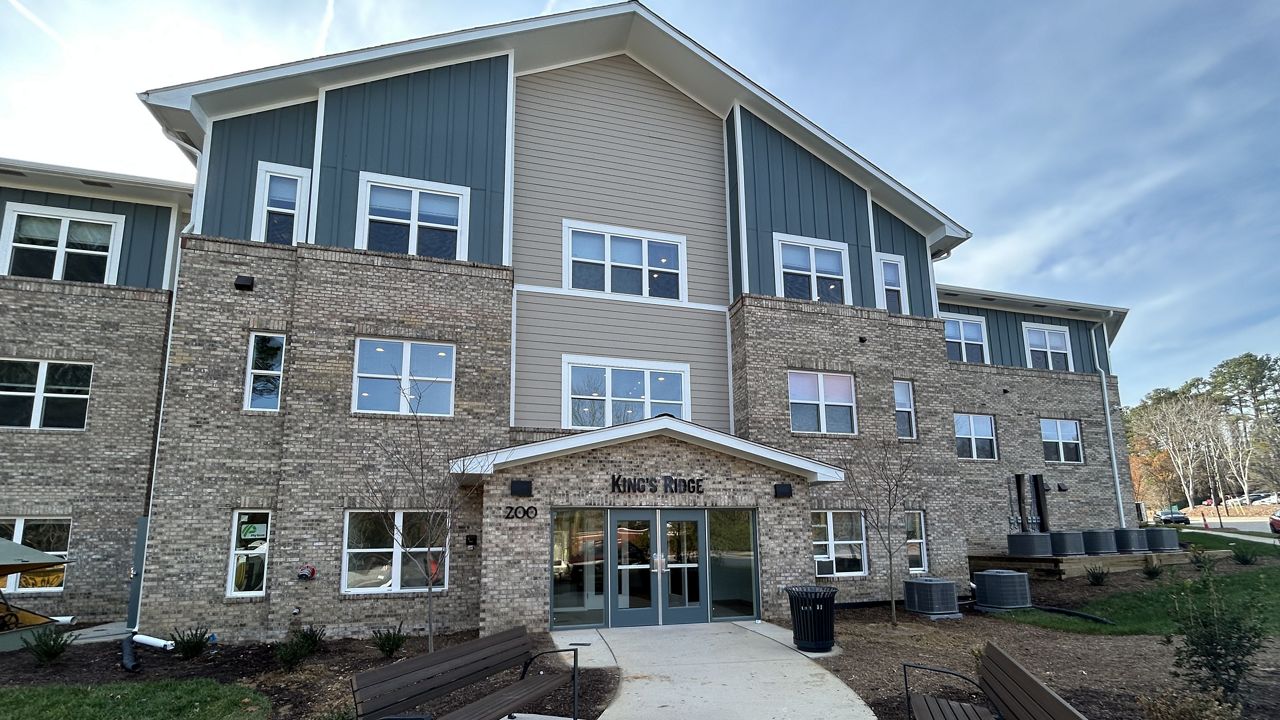WAKE COUNTY – On any given night, an estimated 916 people will experience homelessness in Wake County, 354 of which are classified as chronically homeless, according to Wake County.
"I've never met someone who doesn't want a home," Erin Briggs Yates, an advocate for the homeless, said. "I believe everyone wants and deserves a home."
While strides have been made to address homelessness, she and others who work with this population think more needs to be done.
King's Ridge, a 100-unit affordable housing community in Raleigh, officially welcomed residents on Jan. 28. It's designed to reduce Wake County's homeless population by 10%.
The U.S. Department of Housing and Urban Development defines affordable housing as when the rent or mortgage (principal, interest and taxes included) does not exceed 30% of the household’s gross monthly income.
King's Ridge offers 73 studios, 22 two-bedroom units and five three-bedroom units. Yates, the community's director, recounts an experience with a resident when she first stepped foot in her new home.
“One woman who's been homeless for quite a while… walked in and looked around, and she said, ‘Hold on,’ and so she went to her bed and kneeled down and prayed,” Yates said.
In an effort to fight homelessness, Raleigh recently dedicated $5 million to pilot a program that is changing the city's approach, according to the Triangle Community Foundation. However, shelter workers emphasize that more permanent solutions are needed.
"We need three or four more King's Ridges, but that's going to be years away," Salvation Army shelter case manager Frank Baldiga said.
The Salvation Army operates Wake County's largest family emergency homeless shelter but faces what they say are challenges. The facility maintains about 60-70 beds in its residential section, plus additional drop-in accommodations. However, the shelter has a waitlist of about three to four months, forcing many families to seek alternative temporary housing arrangements, like hotels.
"The poorer you are, the more barriers there are to get housing," Baldiga said. "They're going to check your credit score… do you have any background issues, any misdemeanors or felonies?""The poorer you are, the more barriers there are to get housing," Baldiga said. "They're going to check your credit score… do you have any background issues, any misdemeanors or felonies?"
Local shelters continue to adapt to meet growing needs.
St. John's Metropolitan Community Church in Raleigh recently expanded its shelter services, implementing comprehensive case management programs and relocating to a larger facility. The new shelter operates nightly with a capacity for 98 people, serves about 1,500 individuals annually, and expands capacity during extreme weather through a "white flag" program, adding 140-150 more beds.
"Our vision for this shelter is it becomes like the emergency department…we get you in here, take care of whatever immediate needs you have... and then [determine] what are the next steps," said Pastor Vance E. Haywood Jr., who oversees shelter operations at the church.
In addition to St. John's and The Salvation Army, other resources are available to individuals experiencing homelessness in Wake County:
- The Bryant Center: An emergency drop-in shelter in downtown Raleigh at 4 N. Blount St.
- The Cornerstone Service Center: Affordable housing for "people experiencing chronic homelessness and living with disabling health and mental health conditions"
- Church-based white flag sites: First Baptist Church in downtown Raleigh, Edenton Street United Methodist, Church of the Good Shepherd and the Unitarian church on Wade Avenue provide additional shelter during extreme weather
- Raleigh Rescue Mission: A Christian resource for those experiencing homelessness
- Oak City Cares: A resource for individuals and families at risk of homelessness
- Safe Families for Children Greater Raleigh/Durham: A resource for parents or guardians experiencing homelessness, illness, domestic abuse and addiction
- Haven House of Raleigh: A resource for youth experiencing homelessness, trouble at home or school, or involved in the juvenile justice system
The City of Raleigh announced in 2016 a goal to build 5,700 affordable homes by 2026, and 3,848 affordable homes have been built.
The median sale price of a home in Wake County reached $476,000 as of March 2024, with the median household income at just over $96,000, according to the county. As Wake County continues to grow, advocates for the homeless agree that affordable housing needs to expand.
"The real solution is more housing and more affordable housing," Baldiga said.




